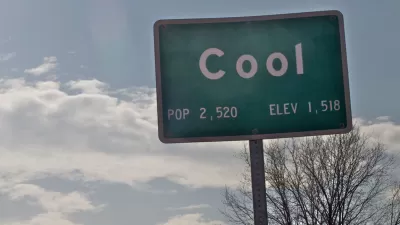It could be as low as nine cents per gallon, or as high as 76 cents, writes UC Berkeley energy expert Severin Borenstein. On January 1, transportation fuels are included under California's landmark cap and trade program.
As noted last month, legislators opposed to the inclusion of transportation fuels have launched a campaign, complete with legislation, to delay it for three years. Borenstein bemoans that campaign, viewing it as "spin over how much gas prices will go up." His comprehensive article in Green Tech Media is his "attempt at de-spinning."
But first, why is this such an important issue? Is this just a debate about how much one can realistically expect "the cap" will add to gas prices, or is there something bigger at stake?
"There is a real policy debate here about how and when California should reduce its greenhouse gas emissions, 38 percent of which come from transportation," writes Borenstein. "I share (UC-Davis economics professor James Bushnell's) view that this is a moment of truth in which California needs to show it will really step up to reduce GHGs," he adds.
Interesting, the spinning is not just being done by industry, which suggests "a price impact of 16 cents to 76 cents." Even the California Air Resources Board (ARB) knows how to play the game, writes Borenstein.
The ARB and some other supporters of fuels under the cap have responded with their own inaccuracies, saying that including fuels in the program needn’t raise gas prices at all and suggesting that any increase is the fault of oil companies.
Borenstein states that based on his review of economic literature, it's "almost certain outcome is that within a few days after January 1, 2015, the cap-and-trade program will cause the price of gasoline in California to increase by 9 cents to 10 cents, a margin that is lower than the drop in gas prices that has occurred over the last few weeks."
The leader of the movement to delay the program for gas and diesel fuel is Assemblyman Henry T. Perea (D-Fresno) who has an opinion published in the San Francisco Chronicle on August 12 explaining his position.
FULL STORY: How Much Will Cap and Trade Raise the Price of a Gallon of Gas in California?

Alabama: Trump Terminates Settlements for Black Communities Harmed By Raw Sewage
Trump deemed the landmark civil rights agreement “illegal DEI and environmental justice policy.”

Study: Maui’s Plan to Convert Vacation Rentals to Long-Term Housing Could Cause Nearly $1 Billion Economic Loss
The plan would reduce visitor accommodation by 25% resulting in 1,900 jobs lost.

Planetizen Federal Action Tracker
A weekly monitor of how Trump’s orders and actions are impacting planners and planning in America.

Wind Energy on the Rise Despite Federal Policy Reversal
The Trump administration is revoking federal support for renewable energy, but demand for new projects continues unabated.

Passengers Flock to Caltrain After Electrification
The new electric trains are running faster and more reliably, leading to strong ridership growth on the Bay Area rail system.

Texas Churches Rally Behind ‘Yes in God’s Back Yard’ Legislation
Religious leaders want the state to reduce zoning regulations to streamline leasing church-owned land to housing developers.
Urban Design for Planners 1: Software Tools
This six-course series explores essential urban design concepts using open source software and equips planners with the tools they need to participate fully in the urban design process.
Planning for Universal Design
Learn the tools for implementing Universal Design in planning regulations.
Caltrans
Smith Gee Studio
Institute for Housing and Urban Development Studies (IHS)
City of Grandview
Harvard GSD Executive Education
Toledo-Lucas County Plan Commissions
Salt Lake City
NYU Wagner Graduate School of Public Service



























